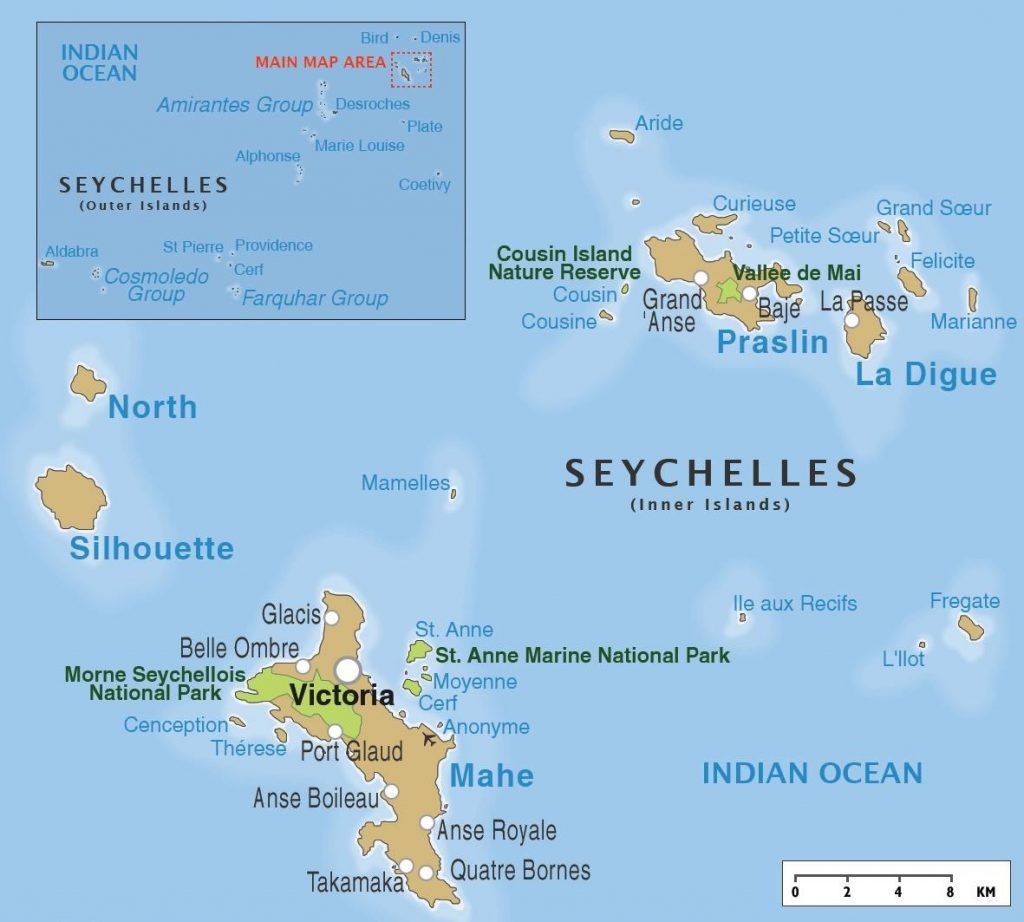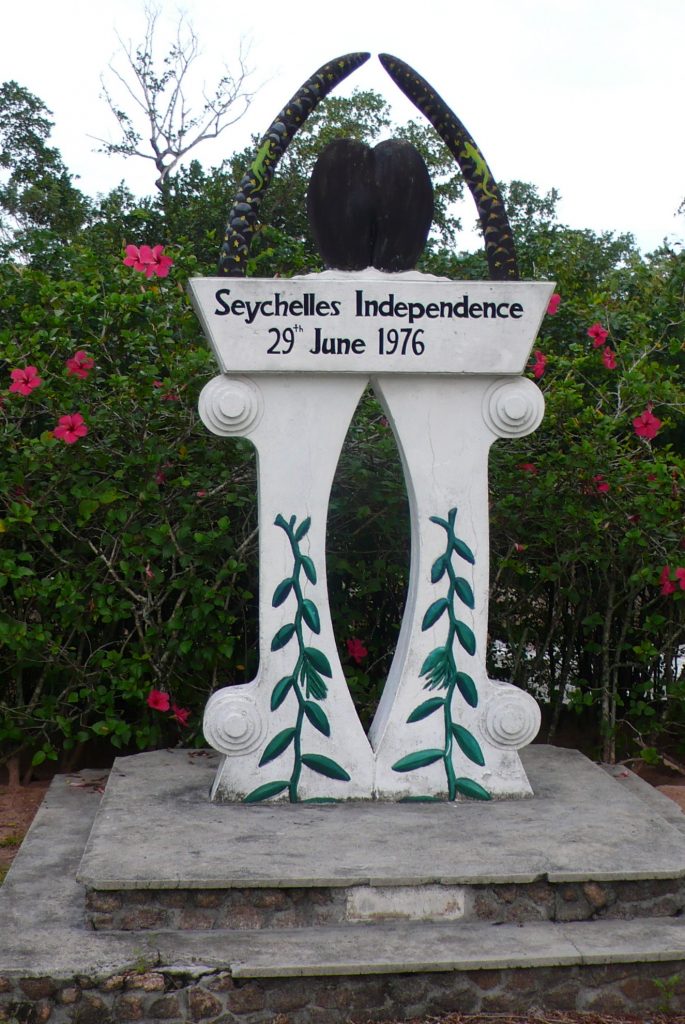Have you ever, randomly, googled “beautiful places on Earth” in search of some picturesque photos for your mobile or laptop wallpapers? I can almost guarantee you that knowingly or unknowingly you have come across some random landscape photos of blue waters caressing the white beaches, a photo so picturesque that it seemed like it could not be real. It must have been edited and touched up in Photoshop.
Well, my friend, what if I told you that those photos aren’t a figment of some AI-generated and edited artwork. What if I told you that a place like that actually exists, a place so beautiful, so picturesque that you would feel like you have stepped into a Windows background. Let me take you on a trip to the Republic of Seychelles islands.
Geography
Lying 4° below the equator in the Southern Hemisphere, Seychelles barely appears to be a dot on the world map. It lies 1,500 kilometers East of mainland Africa in the Indian Ocean. In fact, Seychelles marks the Eastern border of the Somali Sea and is surrounded by Madagascar, Comoros, and Mauritius.

It may appear barely as a dot, however, the Republic of Seychelles is an archipelago. Many blogs and travel videos say Seychelles has 115 islands however, the Constitution of Seychelles lists 155 islands, some of which are engulfed by the sea during high tides. The core of the archipelago is known as the “inner islands” where almost all of the population of Seychelles resides. The inner islands are made up of 44 islands and make up for 54% of the total land area covering 244 sq. km.
Broadly, you can divide the islands in 4 groups: Inner Islands, Amirantes Group, Farquhar Group, and Aldabara Group.
- The Inner Islands. (Granitic Seychelles and Coraline Seychelles) The inner islands, as mentioned earlier, consist of 44 islands. 42 of which make Granitic Seychelles. The term Granitic comes from the granite rocks found here. These fall between 600 meters to 1000 meters from sea level and the topography is rough with huge boulders. Surface streams are the sources of fresh water. Mahé, the largest island in Seychelles falls under Granitic islands and Victoria, the capital of Seychelles is the largest city in Mahé.
The two Coralline islands: Coëtivy and Platte lie south of the Granitic Islands. - Amirantes Group is made up of 29 coral islands, Farquhar Group is made up of 13 coral Islands, Aldabara Group is made up of 67 coral islands making up the Outer Islands of Seychelles Bank.
The inner islands are rocky with cliffs and boulders which are outlined by narrow coastline beaches. The outer islands and coral islands are, in contrast, low-lying and are made up of elevated corals.
Climate
According to the U.N Food and Agricultural Organization, 89% of Seychelles is covered with forests and the Köpen-Geiger System classifies these forests as Tropical Rain Forests. The temperatures rarely fluctuate between the range of 24°C to 30°C (75°F to 86°F). Victoria, the capital city gets higher rainfall ( 142 inches) as compared to the national average of 114 inches annually.

The most pleasant time of the year falls between May to November while December to April are the hottest months. Unlike what general perception would say, Seychelles falls outside the cyclone belt and heavy winds are very rare.
Early History
The first mention of Seychelles comes from Arab manuscripts as early as the 7th Century. In 1502 A.D while rounding off The Cape of Good Hope, Thomé Lopes, a writer in the crew of Vasco da Gama, made the sighting of the Aminartes Group. They mapped a group of 7 islands, naming them “The Seven Sisters”. (Credit: African Democracy Encyclopedia Project). In 1609, the British East India Company was the first to set foot on these islands. However, they did not settle here.

It is in the 1740s when the spotlight was turned on these islands. With the possibility of a war against Britain looming, Bertrand-François Mahé de La Bourdonnais, the French Ambassador to Mauritius dispatched explorer Lazare Picault to these islands in 1742. His main job was to find a faster and shorter route to India. In 1744, Picault named the island he landed on Mahé in honor of the Ambassador.
Annexation by the French Crown and competition against the Dutch Spice monopoly.
In 1756, the islands were annexed by the French and named Seychelles after the name of the French Finance Minister, Viscount Jean Moreau de Séchelles. The name Mahé was left behind for the largest island.
In 1770, in order to compete with the trade monopoly of the Dutch over the spice and to establish a strategic relationship with India, the French sent 15 Frenchmen, 7 slaves, 5 South Indians, and an African woman. Their main job was to attempt to grow spice on the island of Mahé. This experiment however failed.
In 1790, a year after the French Revolution, the head of 12 White Families formed the Assembly of Seychelles and placed it directly under the authority of the French National Assembly.
During this time, the population of Seychelles was made up of White Families, Black Families, and slaves. The French encouraged plantation agriculture, timber industry, and shipbuilding industry that was based on slave labor. Large quantities of slaves were brought from Mauritius, Madagascar, Mozambique, and a small portion from India.
The Treaty of Paris and British Rule
In 1794, during the War of First Coalition, tensions between French administrators in Seychelles and British ships continuously brewed up. However, the French continued to have the control for the majority of the time with an uneasy truce with the British which allowed British ships to pass through the blockade.
With Mauritius falling under British control in 1810 and Britain taking the control of the Napoleonic Wars, in 1814, the Treaty of Paris was signed. This resulted in Seychelles being ceded to the British. It was then that the spelling if the island was changed to the more anglicized version “Seychelles”. The British however paid little to no interest in properly governing Seychelles and the French language, culture and even the Napoleonic Civil Code continued to remain in force. In 1835, slavery was abolished in Seychelles but the former slaves were required to work as “apprentices” for the next 3 years.
Independence
The struggles for the separation from the British Crown had begun as early as 1948 when the first elections were held. But it wasn’t until 1967 that the first completely independent elections were held. Finally, in 1976, Seychelles got independence from the United Kingdom and became a republic. In 1979, a constitution was drafted and declared a one-party Socialist state.

People and Ethnicities
As discussed above, the inhabitation of Seychelles started in the late 1700s with French settlers, slaves, and South Indians. Even after the British got control of the islands, they allowed the upper-class French to retain their affluence. These upper-class French settlers are known as Gran blan or “ Big White”. The slaves usually came from Madagascar, Mozambique, and Creoles ethnicities from Mauritius. The French didn’t permit the influx of Indian laborers as a result of which the Indian population remains in a small minority along with the Chinese minority.

Even after slavery was outlawed, a large number of workers flooded into Seychelles. This has led the Seychelles population to have multiple ethnic backgrounds and origins. The majority of the population is Creole descendants: a mixture of African laborers and slaves and European settlers. Indians, Madagascarians, Filipinos, Malays, and white Europeans make up the minority. According to the survey in 2020, the population of Seychelles is around 91,000.
Language and Religion
Seychellois Creole or Kreol along with French and English are the official languages of Seychelles. Most of the population speaks Creole which has it’s similarities with Caribbean Creole. The use of English and French however is a subject of debate among the general population due to their colonial past.

Roman Catholicism, from the days of French colonialism, remains the major religion with 82% of people following it. Anglican Christians, Hindus and Muslims make up 7%, 2%, and 1% of the population.
Like in many parts of the world, spiritual beliefs, beliefs in shamans (locally named Tonton), witchcraft, and superstition are also common in Seychellois society.
Festivals, Music, and Dances
The Creole Festival is held in October of each year and is organized on the island of Praslin, La Digue, and Mahé. Apart from this The Ocean Festival, The Feat of Assumption of Mary which is one of the major religious festivals in Seychelles is observed in the churches of La Digue.

The dances also mimic the melting culture of Seychelles. Moutia rooted in slavery and having connections to African rhythms, Sega and Kanmtole, a European inspired ballet like dance are famous in Seychelles. The music also has widely varying roots. Polka, taarab, soukos, Brazilian inspired bom and French folk and pop songs are quite famous. The French Contradance has it’s own form Kontredans and Reggae inspired Seggae and Mouggae are representation of the Republic’s history and multicultural background.
Economy and Industries
The first thing that comes to mind while hearing the name Seychelles, is tourism. However, tourism only started taking central stage in 1971 after the first international airport was opened. Before that, almost a third of the population of Seychelles worked in plantations. Copra, cinnamon and vanilla made the major exports.

However, due to the lack of stable prices in plantation-based exports and higher pay in the Tourism sector, the agricultural industry in Seychelles has been on a rapid decline. Now, it barely contributes to 4% of the GDP and less than 10% of the workforce. Tuna fishing and canning and aquaculture are growing industries.
Seychelles is classified as an “Upper Middle Income Country” by the World Bank. Seychelles has one of the highest per Capita incomes among it’s African counterparts and the GDP has been steadily growing despite the trade deficit. The currency is Seychelles Rupee with 5SRS being equivalent to 1 USD. However, inequality in land ownership and monetary power remains among the general population.